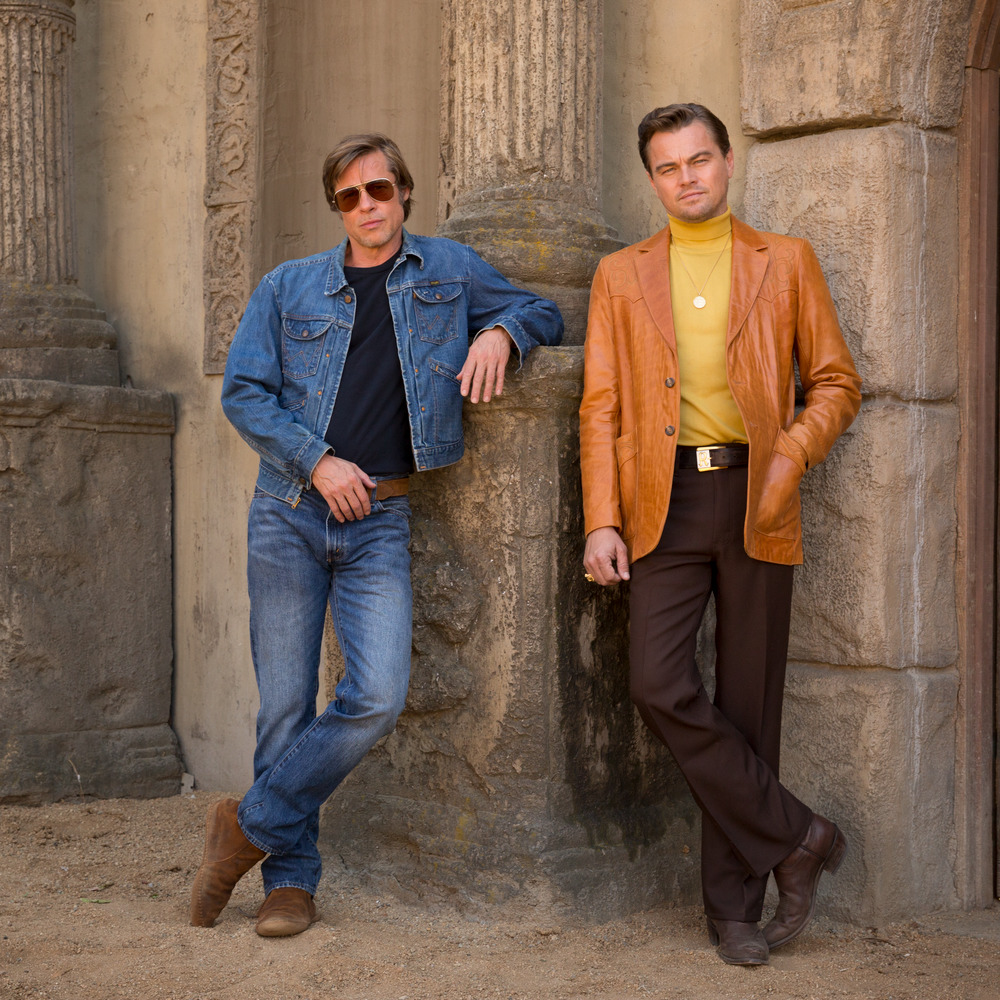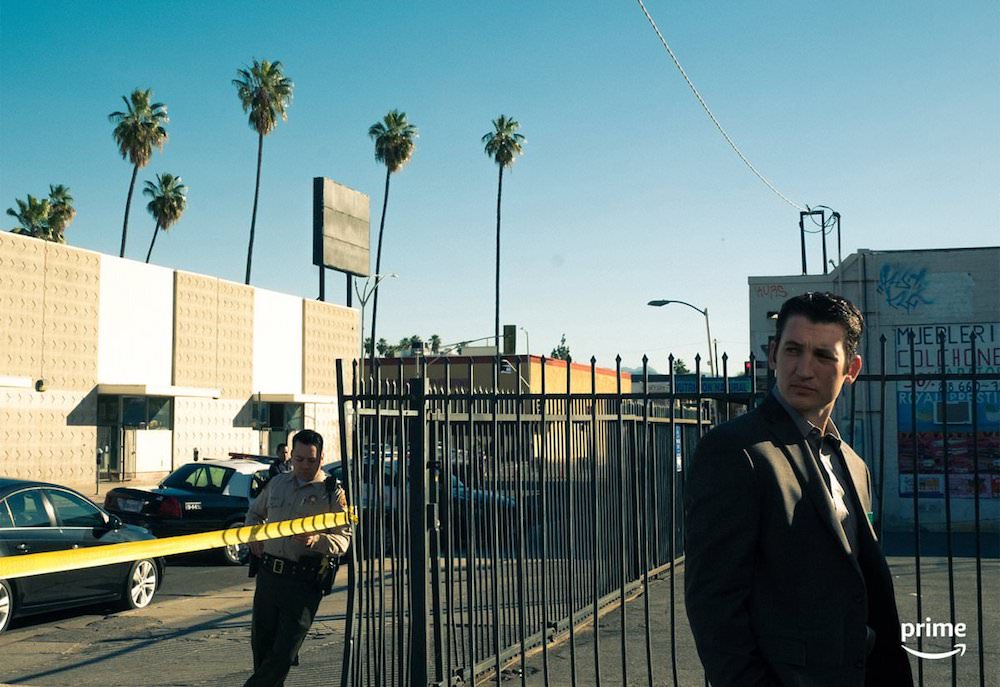August 13, 2021
by Carla Hay

Directed by Danielle Lessovitz
Culture Representation: Taking place in New York City, the dramatic film “Port Authority” features a racially diverse cast (white, African American and Latino) representing the working-class and middle-class.
Culture Clash: After a 20-year-old man with a troubled past moves from Pittsburgh to New York City to start a new life, he becomes homeless and unexpectedly falls in love with a transgender woman who is involved in the city’s queer ballroom scene.
Culture Audience: “Port Authority” will appeal primarily to viewers who are interested in stories about relationships between straight people and LGBTQ people, as well as what homeless life could be like for young men in New York City.

In most movies about heterosexual men who fall in love with transgender women, the man in the relationship usually want to keep the woman’s transgender identity a secret, out of fear that he will be shunned by his peers and/or society. “Port Authority” is no exception, but the man in this story has a big secret of his own that he wants to keep from his lover: He’s homeless. “Port Authority” is a well-acted and occasionally haphazard look at one young couple’s journey into the intersections of sexuality, race relations and social-class tensions, as they strive to be authentic, even if they don’t always tell the truth about themselves.
Written and directed by Danielle Lessovitz, “Port Authority” is told from the perspective of a 20-year-old troubled drifter named Paul (played by Fionn Whitehead), who has moved to New York City from Pittsburgh. As seen in different parts of the story, and by Paul’s own admission, he has an anger management problem and he’s an occasional masochist. Except for when he loses his temper, Paul is generally quiet and introverted. He might have had a lot of experience with life’s hardships, but it soon becomes apparent later in the story that he doesn’t have much experience when it comes to love and romance.
In the movie’s opening scene, Paul has arrived at the Port Authority Bus Terminal in midtown Mahattan and is frustrated to find out that his estranged sister Sara, whom he thought was going to pick up him at the bus terminal, is nowhere to be found. Paul doesn’t have her phone number and doesn’t know where she lives, because this meeting was arranged by someone named Mary. It’s an example of how Paul is not skilled at planning and communication.
While waiting outside and trying to figure out what to do, Paul notices a small group of openly queer young people who are around his age and are gathered nearby. They are African American and Latino cisgender gay men and transgender women. Everyone in the group seems to be friends, and they are comfortable enough with each other that they can tease each other without anyone getting offended. Paul will see this group of friends again later on in the story.
After giving up hope that he will have a place to stay for the night, Paul decides to sleep on a subway. He’s woken up by two middle-aged men, who steal his baseball cap and phone. Little do the robbers know that Paul is a fighter. He gets into a brawl with the two men, but he’s outnumbered, and they start beating him up.
A passenger nearby comes to Paul’s rescue, joins in on the fight, and manages to chase the men away. One of the thieves tosses away Paul’s phone (whose screen is now broken) in the subway car before leaving. The guy who came to Paul’s rescue introduces himself. His name is Lee (played by McCaul Lombardi), and he can sense that Paul is new to the area.
Paul admits that he just arrived from Pittsburgh and doesn’t have a place to stay because his sister, who was supposed to pick him up at the bus terminal, never showed up and he doesn’t know how to find her. Lee warns Paul to be careful where to sleep because he could be robbed again. Lee also mentions that some attackers don’t want to steal but want to sexually assault. Lee talks about an incident where it almost happened to him, but he was able to fight off his attacker.
Lee asks Paul if he’s gay because he notices that Paul is wearing an earring. Paul says no. During this conversation, Lee uses a homophobic slur for a gay man. It will be one of many times in the story that Lee shows that he’s homophobic and that he likes to assert his heterosexuality. Outside on the street, Lee uses some liquor to clean off some of Paul’s bloody wounds from the fight. Paul’s face is covered with blood, and Lee jokes that it looks like a menstruating woman sat on Paul’s face.
As Paul and Lee talk some more, Lee seems to feel sympathy for Paul, so he tells Paul that he’s homeless too and living in a men’s shelter. Lee invites Paul to stay at this shelter, which is in the Gramercy Park area. With nowhere else to go, Paul eagerly accepts the invitation. Several of the young men in the shelter work for a debt collection company that has these guys traveling in a mover’s truck and repossessing people’s home items, such as furniture and TVs.
Why is Paul homeless? Where is his family? It’s revealed later in the story that his father abandoned him and Paul’s mother when Paul was a child. Paul’s mother was unable to take care of him (it’s never stated why), so he was put in foster care until he turned 18. While he was in foster care, Paul rarely saw his mother, who never kept her promise that she would get him out of foster care so he could live with her again.
Because Paul never says that his mother is dead, it’s implied that she’s still alive but he’s no longer in contact with her. Since becoming an adult, Paul bounced from place to place, without finding any real sense of family. He was kicked out of wherever he was living in Pittsburgh, but the movie doesn’t go into the details about why he was told to leave. He’s also on probation for a crime or crimes that the movie does not reveal.
Based on what Paul says, Mary (the person who told Paul that he could live with Sara) seems to be either a mutual friend or relative. Paul has left a message for Mary to call him back. And when she does, Mary gives him Sara’s address. When Paul goes to Sara’s address unannounced (she lives in a comfortably-sized middle-class apartment with a husband or boyfriend), she’s very surprised to see Paul. Sara (played by Louisa Krause) also has guests over and refuses to let Paul inside her home.
Instead, Paul and Sara have a tension-filled, brief conversation in the apartment hallway. Paul tells Sara, “Mary said I could live here.” Sarah looks at him in disbelief and says, “Is this a game? I told Mary no.” As a compromise for not letting Paul stay with her, Sara offers to give Paul a one-time cash gift (a few hundred dollars) to help him. It’s implied that Sara and Paul didn’t grow up together, so they don’t know each other well.
At the men’s shelter, Paul notices that one of the residents is one of the gay men he saw at the Port Authority Bus Terminal. His name is Tekay, pronounced “T.K.” (played by Devon Carpenter), and Paul sees him practicing some voguing dance moves in a stairwell. One night, without Tekay knowing, Paul follows him to a rehearsal space where several people from the queer ballroom scene are having a Kiki, which is a ballroom term for a social gathering where people can hang out and rehearse. In the queer ballroom scene, contestants are judged on how they move and what they wear.
The people rehearsing are from a ballroom competition group (also know as a “house”) called the House of McQueen. All of the people in the House of McQueen (including Tekay) call each other siblings and treat each other like a loving and supportive family. And they have also informally taken the last name McQueen, in honor of the name of their ballroom house. The leader of each house is called a “house mother” or “house father.”
Paul immediately stands out at this Kiki because he’s the only white person there. One of the McQueen brothers in the room asks Paul suspiciously who he’s with or who invited him there. It’s right then and there that Paul and a pretty McQueen sister named Wye (pronounced “why”) see each other across the room. Wye (played by Leyna Bloom) was among of the queer group of friends whom Paul saw at the Port Authority Bus Terminal, but she was talking with her friends and never noticed Paul. This time, Paul and Wye lock eyes in the way that people in movies do when you know they’re going to fall in love.
As Paul is being interrogated on what he’s doing there, he manages to mumble that a friend invited him. But this McQueen brother wants to know which friend. Paul doesn’t have an answer, so he’s told to leave. As an embarrassed Paul walks out into the street, free-spirited and emotionally intelligent Wye approaches him and makes an apology for her “brother” being so rude.
Paul offers Wye a cigarette, but she declines and says she’s trying to quit smoking. As proof, Wye shows Paul the nicotine patch that she’s wearing. Paul doesn’t waste time in asking Wye out on a date, and they head to a pizza place that’s nearby.
During their conversation at the pizza place, Wye tells Paul her name and asks him why his face is injured. Paul tells her that he got into a fight. He adds, “I have this anger thing. Sometimes I do stuff. It gets me in trouble.”
Wye opens up a little about herself too. She tells Paul that she used to be in the U.S. Navy. He’s a little surprised and responds by telling her that she could be a model. Wye is coy and says that she’s “single and unavailable.” The date ends as soon as they finish their pizza, but they exchange phone numbers.
But by the end of this date, Paul and Wye have left certain things unsaid. Paul doesn’t tell Wye that he’s homeless and living in a shelter because he’s ashamed of being homeless. Instead, Paul lies and tells Wye that he’s living with his sister. Wye doesn’t tell Paul that she’s a transgender woman because she assumes that he knows because of where they met.
Paul might be street-smart in some ways, but at this point in the story, he’s completely ignorant about the queer ballroom scene. Later in the movie, Paul tells another lie to Wye and her friends about what he does for work. He tells them that he helps people “move stuff,” but he doesn’t say that what he moves are repossessed items because he works for a debt collector.
It’s not spoiler information to reveal that Paul eventually finds out that Wye is transgender. How he finds out won’t be revealed in this review, but is revealed in the movie’s trailer. It’s enough to say that Paul finds out that Wye is a trans woman after he’s already fallen for Wye but they haven’t had sex yet.
And he’s not happy to hear about her transgender identity because, as he tells her, “I’m not gay!” Wye says she’s not looking to be with a gay man either. There are hints throughout the story that although Paul isn’t a virgin, he’s never really had a meaningful romance, because he doesn’t mention any ex-girlfriends. It’s very likely that Paul’s relationship with Wye could be the first time that he’s really fallen in love.
During his romance with Wye, Paul becomes fascinated by the ballroom scene. The McQueen family members at first eye him with some skepticism and caution. They think Paul might be a “chaser” (a straight man who fetishizes trans women), but eventually they see that Paul and Wye genuinely care for each other and respect each other. Some viewers might think that Paul is accepted by the McQueen family a little too quickly, but it’s clear he got this quick approval only because of his relationship with Wye.
Wye lives with several of the McQueen family members in the same apartment. The house leader is Mother McQueen (played by Christopher Quarles), who is the oldest member of the group and who acts like a surrogate parent to everyone. The other McQueen family members in the apartment are Max McQueen (played by Max Kpoyour), Azza McQueen (played by Azza Melton), Taliek McQueen (played by Taliek Jeqon) and Eddie McQueen (played by Eddie Plaza).
It’s a very different group from the macho and rough guys who are at the men’s shelter. Lee is the unofficial leader of the shelter residents who work as debt collectors. Another guy in this group is a tall, beefy blonde named Nix (played by William Dufault), who is very homophobic like Lee is. Nix also has a quick temper and is ready to pick a fight with anyone who’s openly queer or whom he thinks might be queer. Nix is the first one at the shelter to see signs that Paul and Tekay have been hanging out together.
While Paul spends time with Wye during ballroom rehearsals and in the McQueen family’s apartment, he also learns the hierarchy of the ballroom categories: The most difficult challenges are for the most experienced or most talented members of the house. For example, the face challenge is easier than the runway challenge. Wye tries to convince Mother McQueen that she’s ready to graduate from the face challenge to the runway challenge.
The House of McQueen is competing in a ballroom competition where the grand prize is $1,000. They need the money because the house members who share the same apartment are close to being evicted for non-payment of rent. (When Wye first takes Paul to the apartment, she quickly hides the eviction notice that’s on the front door.) And considering that Paul works for a debt collector, it’s very easy to speculate what might happen.
The romance between Wye and Paul is very sweet and doesn’t move too quickly. Their interracial relationship is not a problem for either of them or Wye’s queer community of friends. In fact, when Paul asks if it would be possible for him to participate in a ballroom competition, a lighthearted joke is made that he could present “white boy realness” in his challenge. In all seriousness, Wye explains that in the ballroom scene, couples are not allowed to be in the same ballroom house.
Paul and Wye eventually open up to each other about their respective troubled backgrounds. Wye says that she was bullied at school for being different. And when she was 16, she was kicked out of her home after borrowing her stepmother’s pink leather jacket to wear it at school. Of course, being rejected by her family wasn’t really about the leather jacket. It seems too painful for Wye to say the real reason out loud.
Meanwhile, Paul’s secret of being homeless becomes harder for him to keep from Wye when she eventually wants to see where Paul lives. Tekay knows Paul’s secret because Tekay is living at the shelter too, and he doesn’t want his McQueen family to know. Paul and Tekay have an unspoken agreement to keep their homeless secret from the McQueen family.
“Port Authority” is not the type of movie that keeps the same pace throughout the story. There are ebbs and flows, just like there would be in real life. However, there’s some melodrama in the last third of the movie that could make or break the romance between Wye and Paul. How it’s resolved is kind of rushed into the story in a way that could happen in real life, but it still seems a little too contrived.
The movie’s greatest strength is in the believable acting by the principal cast members. Whitehead’s Paul has an interesting mix of being vulnerable and emotionally damaged but also an unpredictable and violent loose cannon. Bloom’s Wye realistically portrays someone who is trying to figure out how to articulate her feelings about being a trans woman to people who are not part of the LGBTQ community. Lombardi’s Lee accurately depicts the type of toxic masculinity among homophobic men who think they’re “good guys” because they’re loyal to other men who identify as straight, without much regard for how their hateful bigotry can hurt other people.
“Port Authority” was filmed on location in New York City and has real people from the city’s queer ballroom scene, which add to the authenticity of the movie. Yes, it’s a scripted movie with actors. But there are certain ways that people in the ballroom scene talk and move that just can’t be faked. These ballroom culture scenes are among the best in the film.
The movie also shows that although Paul is the only straight person and the only white person who’s hanging out with the House of McQueen, he’s eventually accepted into this social group because he treats them respect. The homophobic thugs at the men’s shelter offer no such courtesy to queer people because they don’t care about getting to know anyone who doesn’t fit their definition of “acceptable sexuality.” Paul is walking a tightrope with his secrets and lies because he’s literally caught between these two worlds.
Paul might have anger management problems, but he doesn’t get violent or abusive with women. The movie shows that underneath his somewhat unstable emotional state, he has a gentleman’s sensibility in how women should be treated. There’s a scene where Lee invites Paul to a party, where Lee encourages one of the young women at the party to hook up with Paul as soon as she meets him. Paul abruptly leaves the party not because he’s not sexually attracted to women but because he’s uncomfortable with how this woman is being objectified by Lee.
“Port Authority” writer/director Lessovitz has crafted a story that might resonate more with viewers who understand the LGBTQ community rather than people who don’t care to understand the LGBTQ community. That’s because “Port Authority” tends to wander and lose a little bit of focus midway through the film. The capable performances by the actors should sustain most people’s interest.
However, certain viewers who aren’t curious to see what will happen to Paul and Wye might get bored and might not finish watching the movie. People who watch the movie until the end might not get the ending they expect. However, “Port Authority” is a solid addition to the small number of mainstream indie films about straight men who fall in love with transgender women. The movie’s story takes place over a few months, so it’s more of a snapshot portrait than a sweeping epic.
Momentum Pictures released “Port Authority” in select U.S. cinemas on May 28, 2021, and on digital and VOD on June 1, 2021. The movie was released in France in 2019.








